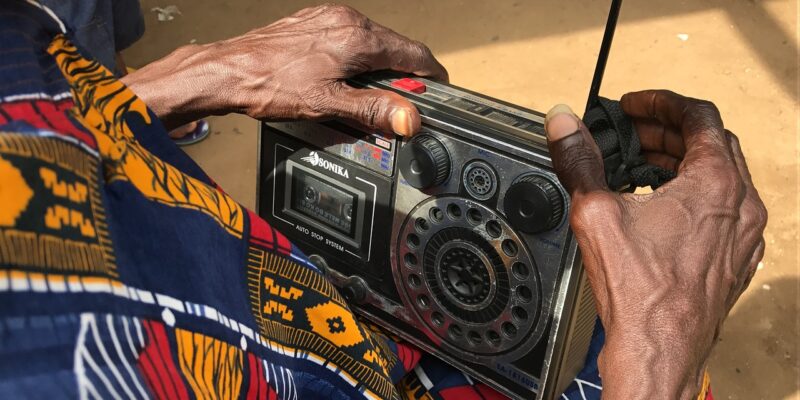Wither Ecology Literacy in Indigenous Language Radio Programming?

By Ganiyat Tijani-Adenle
While there may not be a complete consensus about how to stall climate change, the world is not in disagreement that the activities of people, corporations and governments are depleting the earth and destroying the world’s ecosystem. Blame slavery, colonialism, neocolonialism, greed, corruption, poor governance, injustice or ignorance, African nations are worst affected by climate change, while they are not prominent among the list of countries taking decisive steps to curb the impact of global warming.
Cultivating citizens’ commitment to act responsibly towards nature, while mandating best practices for corporations and governments, cannot be achieved without ecological literacy. However, in many African countries, the media, who are the main institutions with the capacity to perform this role, are hardly doing enough. Unfortunately, the little that is being done is disseminated in colonially-acquired national official languages (like English and French) that may not resonate with the average African. Experts have also argued that communicating with people in their first (and indigenous) languages generate understanding and emotional sentiments sometimes required in motivating change when issues like ecology are concerned. Also, mainly promoting ecology literacy in English language in Nigeria, for instance, excludes the elderly and non-English literate population from the enlightenment to improve how they relate with the ecosystem as well as the agency to insist on best practices from corporations and governments.
With the Declaration of Los Pinos, the United Nations declared 2022 to 2032 the International Decade of Indigenous Languages. This, alongside commemorating the International Mother Language Day on 21 February every year, is one of several efforts to revitalise indigenous languages and prevent indigenous language deaths. These efforts are not just made on the global scene. National governments are also making efforts to protect indigenous languages by promoting their use, and these efforts are paying off with the improved use of indigenous languages in domestic settings and in media contents.
The Yorùbá language is one of the three prominent indigenous languages in Nigeria, with its speakers predominantly in Southwest and in some parts of North-Central Nigeria. Many Yorùbá language radio stations owned and managed by state governments and private individuals are springing up across the region. As part of my research, I interviewed the managers, news and programmes directors in six of these Yorùbá language focused radio stations in each of the six Southwest states in Nigeria. I discovered that while they have a few programmes on agriculture and farming, there are no deliberate efforts to report ecology issues, provide ecology literacy and motivate the listening publics to utilise their agencies to demand best practices from themselves, corporate organisations and the government.
The political-economy of media management can be held responsible for this dearth in ecology-focused programming in South-west Nigeria. Media managers are concerned about their relationship with the government and do not want to be ‘covertly’ penalised for setting a media agenda that will call out governments’ ineptitude regarding ecology issues. They also want to broadcast entertainment programmes that will attract more listeners compared to ecology-literacy programmes that may not deliver high ratings for commercials. Some of the corporate giants that should be called out for violating the environment are also the big advertising spenders. The advertisements will thin out if their programmes do not suit these advertisers. All these survival and money decisions, coupled with a lack of awareness/appreciation of the role of the media in reporting the increasing impact of ecological damage and its likely consequences can be adduced for the current situation.
Southwest Nigeria, while not immune to global warming and ecological issues, is not challenged like the Niger Delta battling with oil pollution or the North suffering from desertification and flooding. The region does not currently endure the fate of the other regions in the country and maybe that explains the lacklustre attitude to the coverage of ecology issues by indigenous radio stations in the region. What is more, the inadequate resources to cover germane issues not perceived as emergencies, self-censorship to prevent being perceived as anti-government or adversarial, the esoteric perception of ecological issues, as well as the challenge of translating key concepts in ecological discourse to Yorùbá language has resulted in a poor coverage of ecology issues by Yorùbá language focused radio stations in the six Southwest states in Nigeria (Lagos, Oyo, Ogun, Osun, Ondo and Ekiti).
The media are some of the institutions that need to make profits to survive, but they must prioritise their responsibilities to the societies in which they operate, even when some of their key roles will not yield income. If Yorùbá language focused radio stations in Southwest Nigeria do not prioritise the promotion of ecology literacy despite its poor economic value, the citizens and residents of one of the key regions in this sub-Saharan nation will not be enlightened about ecology issues, they will not apply nor promote best practices, and neither will they be able to hold corporations and governments accountable.
Nowhere in the world have citizens, corporations, as well as governments act responsibly in their relationship with the ecology without ecological literacy and advocacy. If Yorùbá language focused radio stations in Southwest Nigeria disenfranchise their listeners by depriving them of ecological literacy, the sleeping Giant of Africa will continue in a trance while the citizens, corporate organisations and government representatives continue to pillage the earth in Nigeria – one of the countries with the largest land mass in Africa and the 32nd in the world.
Ganiyat Tijani-Adenle is a postdoctoral fellow in the Indigenous Language Media in Africa (ILMA) Research Entity at North-West University, South Africa. Her research interests sit at an intersection of communication, media, and sociology. She participated in the "African Ecologies" writing workshop, hosted at the British Institute in Eastern Africa (BIEA), 29-31 July 2023 in collaboration with the Leeds University Centre for African Studies. This blog post is based on the paper she presented at the workshop.
